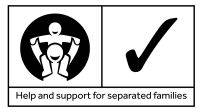If it’s not managed properly, contact with children can become a source of conflict between separated parents. Dad.info offers some tips on reducing conflict around contact and what to do if things start going wrong.
Getting contact arrangements right in the first place can save a lot of anguish later on. Here are some things to think about when agreeing contact:
- try to reach agreement as soon as possible after the separation
- don’t use contact as a way of getting back at your children’s mother
- be realistic and don’t demand more than you can handle
- be flexible and remember that contact should suit your children’s needs
- try to craft a routine that suits you and your child’s mother
Resolve contact issues by talking, if possible
Resolving disagreements around contact can be difficult, especially if your relationship with mum is not great. But it’s always worth trying to resolve issues by talking first. Something simple may have caused the problem – a breakdown in communication for instance – and simply getting things out in the open can sort problems out.
Communicating with your child’s mother
Try to think of changes in circumstance that may have contributed to the present situation. Have either of you introduced a new partner? Have there been changes to work patterns? Have you had problems around child support? Is your child growing older and needs different arrangements?
Mediation: agreeing without the courts
Resolving contact issues through the courts
If you are unable to resolve disagreements by talking, you may need to consider turning to the courts for assistance. Think of this as your last option, though, as introducing legal processes can sometimes create greater division, not less – and it costs; children are put under enormous strain when their parents are involved in court actions.
Before entering the court process, you should get some professional legal advice from a solicitor who specialises in family law. Make sure that you understand how the process works and that you have everything you need to present your case. It is important that you also check your parental status.
Parental responsibility: you and the law
You will first need to make an application on a standard form giving brief details about the background or issue court proceedings using the Scottish procedures if you are in Scotland. The court will then usually fix a brief hearing to decide how the application should proceed.
Once at court, you and the other parent will usually get an opportunity to discuss the problem with a court welfare officer. This officer is often referred to as a Cafcass officer. Cafcass is the government agency that is charged with looking after the interests of children involved in family proceedings.
The family courts: residence and contact orders
If you unable to reach an agreement the judge will decide what evidence they need to make a decision about contact. You may both be asked to meet separately with a Cafcass officer. Evidence may include:
- a written statement setting out your views on contact
- a Cafcass officer’s report
- a Cafcass officer’s recommendation
At a final hearing, the judge will make a decision about what contact should take place.
In Scotland
In the Sheriff Court (you can use the Court of Session as well, but it’s unusual to do so, and has slightly different procedures), there will be a Child Welfare Hearing and then probably a further series of hearings in order to determine interim arrangements. The Sheriff will try and get the parties to agree, possibly over a series of hearings. If no settlement is made there will ultimately be a Proof at which witness evidence will be heard, and the Sheriff will decide on what, if any, final Decree about contact/residence to make.
What if my child’s mother breaches the contact order?
If the court has made an order for contact then it expects the resident parent to encourage the child to have contact and ensure that it takes place. If they don’t, the resident parent is at risk that they will be held in contempt of court. In such cases, you should seek further legal advice.








